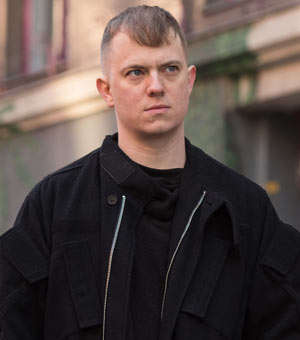Jarman, Julien, Wittgenstein, Martians
by Travis Jeppesen on May 22, 2008
Of all the possible mediums he could have chosen, it is somehow curious that Derek Jarman decided to become a filmmaker. He didn’t just do film, of course, but it is for his films that he is best known. Perhaps you get the feeling, when watching some of these movies, that they should have been plays. Perhaps this is due to the fact that the films are not really films at all, and their theatrical energy is the immediate feature that engulfs you, that allows you to withstand their occasional lapse into preachiness.
A recent trip to London led me to re-assess my thoughts on Jarman. I was never the biggest fan of his films, but something about his style nevertheless captivated me. By the time I saw most of them in the late 1990s, their political content was already starting to feel quaint – the product of a former era, which is sad considering the fact that he was one of the few artists with AIDS brave enough to take a stand and address his illness in public when such matters were still considered taboo. At the same time, it no longer felt like one was fighting a battle by being queer; if anything, the battle was now against the commoditization of gay lifestyle, a subject that had been brought to task by a new generation of gay filmmakers led by Bruce LaBruce.
The exhibition I saw at London’s Serpentine Gallery attempted to assert Jarman’s historical relevance. Organized by the artist Isaac Julien, it featured Julien’s recently completed documentary on Jarman; a screening of Jarman’s final film Blue, which features a blue screen and the voice of the filmmaker, speaking intimately to his audience; several of his rarely seen super 8 films; and a small selection of his paintings.
The exhibition is closed now, but the work, of course, will live on, in its own small way. What I mean by this is that Jarman’s films do not play well on the small screen – they really need to be watched in a cinema in order to gauge their peculiar theatricality. It is probably the theatricality itself – particularly in films like Jubilee, Jarman’s clunky, heavy-handed vision of a post-apocalyptic England populated by punks – that makes these movies feel so dated. In her book Aliens and Anorexia, Chris Kraus writes that calling someone’s work “theatrical” is about the worst insult you can give an artist these days; she then goes on to show us the implicit value in theatricality, the heightening of the emotions over the self-conscious “coolness” that, now that it’s been about forty years since Warhol did anything important, is starting to feel a bit cliché, to put it mildly. When applied to Derek Jarman’s oeuvre, Kraus makes a convincing argument for re-considering the maverick filmmaker’s work.
Julien’s Derek, on the other hand, makes no real argument for the work’s ongoing importance, focused as it is on Jarman himself. I find it rather odd that Julien, who is an artist, would make a documentary that doesn’t bother engaging in aesthetic questions regarding Jarman’s work. Given Jarman’s politicized existence, his personality is already better known than his films; Derek merely tells us, once again, that Jarman should be canonized. Well, there’s no need – everyone already knows he’s a saint.
More helpful to me than the exhibition was my subsequent discovery of Wittgenstein, one of Jarman’s final films, on DVD. I’d wanted to see this film for years, but found that it was tremendously difficult to track down. The film was Jarman’s last before Blue, and is rarely discussed. When it is mentioned, it is mostly in derogatory terms, inferring that the film was considered by most to be a failure. I think it’s quite the opposite – it is perhaps even Jarman’s masterpiece.
I don’t think it’s a random coincidence that Jarman chose the elusive philosopher as one of his final subjects. Wittgenstein evolved a sort of performative philosophy that was unique in the history of the discipline. He asked questions that you technically were not supposed to ask, he brought common sense thinking back into a realm from which it had long been excluded, and he used his imagination to design scenarios and conceptualize his thoughts into patterns, the universal applicability of which he would rigorously test. He re-wrote his work over and over, discarding his thoughts almost as fast as they came to him, only publishing one completed book in the course of his lifetime. He came to see philosophy “as a by-product of misunderstanding language.”
Jarman understood Wittgenstein, a figure whose philosophy and personality seemed interwoven into one complex whole that very few managed to unravel. In one scene, Jarman has a Martian interrogate Wittgenstein as a child about philosophers. The dialogue that ensues is a witty take on the limits of language, one of Wittgenstein’s central problems.
Like Wittgenstein, Jarman had his own style that seemingly came out of nowhere. In The Angelic Conversation, disconnected sound and image form a sort of collage wherein elements of camp and classicism merge. The “story” seems to have to do with two beautiful men finding themselves – and each other – in a journey traversing “forbidden” desire; when the two men wrestle, it is almost impossible for us to tell if they are fighting or fucking. A grinding soundtrack by Coil feeds into the barrage of lo-fi images spread across the screen, and a selection of fourteen sonnets by Shakespeare is read by a female voice. The film coheres not merely on a cerebral level, but on an emotional one, as well.
Not all of Jarman’s films work so well, but it doesn’t matter. His peculiar concern with philosophy, sexuality, the apocalypse, classicism, and modernism – not to mention his fierce political commitment, a sensitive and personal response to the West’s self-destruction – must be re-visited every now and then in order to see their importance.


Leave your comment